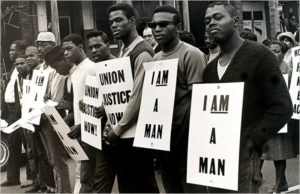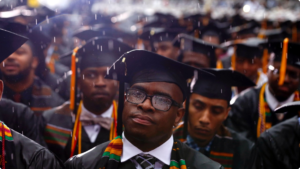“Cotton’s family tree tells the story of several generations of black men who were born in the United States but who were denied the most basic freedom that democracy promises—the freedom to vote for those who will make the rules and laws that govern one’s life. Cotton’s great-great-grandfather could not vote as a slave. His great-grandfather was beaten to death by the Ku Klux Klan for attempting to vote. His grandfather was prevented from voting by Klan intimidation. His father was barred from voting by poll taxes and literacy tests. Today, Jarvious Cotton cannot vote because he, like many black men in the United States, has been labeled a felon and is currently on parole”. (Michelle Alexander, The New Jim Crow)
I would never have thought that a book details the happenings during the time of Jim Crow, would be so reminiscent of the actions being portrayed in the media today. I’ve often heard that what is happening today “is nothing new, and that it is only technology that has evolved”, as things are now being recorded for all to see. But those actions (Murders, beatings, etc.) are very much parallel to the actions happening today. Michelle Alexander explains in detail, the many reiterations of systems built upon the backs of African American’s in this country.
Slavery was the first wave of this system, she begins by addressing the issue of race. She sheds light upon the fact that this idea of ‘race’ is a fairly recent development, implemented here in America in order to classify people. ‘Blacks” were shipped in directly from Africa (instead of an English speaking country), in an effort for whites to protect their superior status and maintain dominance (non-English speaking slaves, were much easier to control). The next wave to come was the era of Jim Crow. When I think of the Jim Crow era, I often think of this idea of ‘separate but equal’ and lynching. Considered technically ‘free’ blacks were often killed, beaten, and terrorized by ‘superior whites’. The men were feared, the women were raped, and the children were sold. And although America was thought to have been built on values such as liberty, freedom and equality, blacks were seen and treated as second-class citizens. She then speaks about the era of mass incarceration. The increased population of African Americans in prisons, and the deterioration of the black community.
Today these actions (killings, beatings, etc.) are not only seen and witnessed by those in the community, but they are also filmed and televised for all to see. W.E.B. Du Bois discussed the idea of the “Emmett Till Generation” and how blacks were traumatized by the lynching’s happening, within their communities. And with the rise of modern lynching’s (police brutality and killings) happening today, I wonder how the active media presence during this time will impact future generations? Ida B. Wells discussed the role that media platforms can play in documenting historical events that are often overlooked and brushed under the rug. As a journalist she keep a record of the atrocities taking place, and kept her community informed on these happenings. Going forward I believe that the media will be a key component, in the spread and documentation of these recent events. And I believe that more people will begin to utilize this platform to bring attention to these happenings within our own community.


